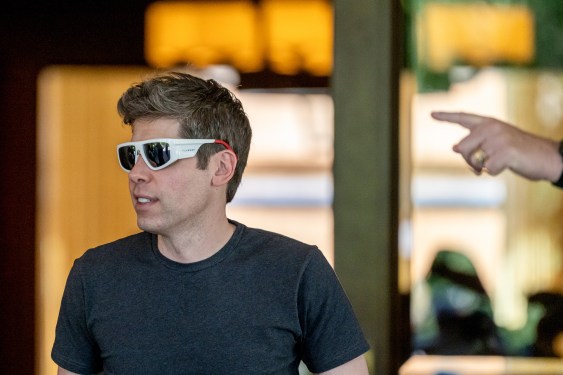I’m sitting at a Mediterranean restaurant in San Francisco, gazing out at Alcatraz Island while hundred-dollar fish dishes sit on the menu. As I chat with fellow reporters, OpenAI CEO Sam Altman walks through the door to my left. He’s staring at his bare iPhone, showing us something, and an impulsive remark escapes me: “No phone case is a bold choice.”
Of course, I quickly realize that the billionaire CEO of OpenAI, who employs Apple veteran Jony Ive, cares more about the iPhone’s original design than the cost of replacing it. “Listen, we’re going to ship a device that is going to be so beautiful,” Altman says, referring to OpenAI and Ive’s upcoming AI device. “If you put a case over it, I will personally hunt you down,” he jokes.
Altman had invited about a dozen tech reporters to join him and other OpenAI executives for an on-the-record dinner (and off-the-record dessert). The evening left us with more questions than answers.
For example, why is Nick Turley, the VP of ChatGPT, handing me a lamb skewer just a week after launching GPT-5? Was this a ploy to get me to write favorably about OpenAI’s biggest AI model launch, which fell short of the years of hype surrounding it? Unlike GPT-4, which surpassed rivals and redefined expectations, GPT-5 performs roughly on par with models from Google and Anthropic. OpenAI even reintroduced GPT-4o and ChatGPT’s model picker after users raised concerns about GPT-5’s tone and routing system.
But as the night unfolded, it became clear this dinner wasn’t really about GPT-5. OpenAI’s executives hinted that AI model launches no longer hold the same weight they did when GPT-4 debuted in 2023. Today, OpenAI is a different company, focused on disrupting legacy players in search, consumer hardware, and enterprise software.
Altman shared new details about these ambitions. He mentioned that incoming CEO of applications, Fidji Simo, would oversee multiple consumer apps beyond ChatGPT—some yet to be launched. Simo, set to start in a few weeks, might spearhead an AI-powered browser OpenAI is reportedly developing to compete with Chrome. Altman even floated the idea of OpenAI acquiring Chrome if it ever went up for sale, though he doubted the possibility.
Simo could also oversee an AI-powered social media app, something Altman expressed interest in exploring. He criticized the current state of AI in social media, saying there’s “nothing” inspiring about it and that he wants to build a “much cooler kind of social experience with AI.”
While Turley and OpenAI COO Brad Lightcap mostly listened, sipping wine with the other guests, Altman confirmed reports that OpenAI plans to back Merge Labs, a brain-computer interface startup aiming to compete with Elon Musk’s Neuralink. He clarified that the deal isn’t finalized but said, “I would like us to.” How closely the startup will tie into OpenAI’s models and devices remains unclear.
Despite the talk of browsers and brain chips, GPT-5’s rocky reception lingered as the elephant in the room. Eventually, the conversation circled back to the model that had brought us together.
Altman admitted OpenAI mishandled the deprecation of GPT-4o without warning users, promising clearer transitions in the future. Turley shared that OpenAI is rolling out an update to make GPT-5’s responses “warmer” without being overly agreeable, ensuring it doesn’t reinforce negative user behaviors.
“GPT-5 was very to the point. I like that—I use the robot personality; I’m German, whatever,” Turley said. “But many people don’t, and they really liked how ChatGPT would check in with them.”
Balancing these preferences is tricky, especially since some users have developed unhealthy dependencies on ChatGPT. Altman estimated that less than 1% of users fall into this category—still potentially tens of millions of people. OpenAI collaborated with mental health experts to refine GPT-5’s responses, ensuring it challenges harmful behaviors.
Despite the criticism, GPT-5 hasn’t hurt OpenAI’s business. Altman revealed that API traffic doubled within 48 hours of launch, and demand has left the company effectively “out of GPUs.”
The night’s contradictions—disappointing launches alongside record-breaking usage—mirror OpenAI’s current reality. With bets on browsers, brain chips, AI chatbots, and ventures in data centers, robotics, and energy, Altman envisions a company far larger than just the maker of ChatGPT. The end result might resemble Google’s parent Alphabet, but with even broader ambitions.
By the end of the evening, it was clear this wasn’t really about GPT-5. It was about managing expectations for a company eager to outgrow its most famous—and controversial—product. Going public seems likely to meet OpenAI’s massive capital needs. In preparation, Altman appears keen to refine his relationship with the media. More importantly, OpenAI wants to reach a point where it’s no longer defined solely by its best AI model.

